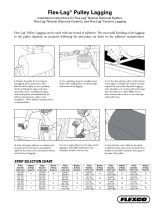Page is loading ...

Installation instructions
Range hood DI-SL9
Island hood
Operating modes: extracted air / recirculation air
J391.113-0
11.2.09 ITH
1
These installation instructions apply to the model: 391 (DI-SL9, construction width 90 cm)
Identification plate
A Remove grease filter. The identification plate is on the inside of the appliance.
Supplied installation accessories
All fixing elements are contained in the scope of delivery.
Extraction mode
A Information on the necessary mains voltage, type of current and fuse protection is to be obtained from the identification plate.
The appliance should be installed by qualified personnel only. Each step must be carried out and checked in full in the order
specified.
Validity
General notes
With the simultaneous operation of firing (e.g. wood, gas, oil or coal-fired heating systems), safe operation is only possible pro-
viding a room negative pressure of 4 Pa (0.04 mbar) is not exceeded at the location of the appliance. Risk of toxic fumes! An
adequate flow of fresh air must be guaranteed, e.g. via non-closable openings in doors and windows and combined with ven-
tilation wall bricks for incoming and exhaust air or by other technical means.
If the appliance is installed over hobs, each cooking zone must be fitted with an ignition fuse and the minimum distances (see
section «Dimensions») must be adhered to.
Efficient repairs can only be guaranteed if it is possible to disconnect the appliance at any time without causing any damage.
The extracted air must not be fed into a chimney which is used for exhausting fumes from appliances burning gas or other fuels.
Always observe the fire regulations.
Electrical connections
Electrical connections must be carried out by trained electricians in accordance with the guidelines and standards for low volt-
age installations and the specifications of the local electricity supply companies.
A plug-in appliance may only be connected to a socket outlet with earthing contact, installed according to specifications. A
mains isolating device with 3 mm contact opening should be provided in the house wiring system. Switches, plug and socket
devices, circuit breakers and fusible cut-outs which are accessible after installation and which have all-poles switching are per-
missible as isolating devices. Effective earthing and separately installed neutral and earth conductors ensure safe and fault-
free operation. After installation, live parts and cables with basic insulation must not be accessible. Old installations should al-
ways be checked.

Installation instructions
Range hood DI-SL9
Island hood
Operating modes: extracted air / recirculation air
J391.113-0
11.2.09 ITH
2
Indications
䡲 Avoid routing the exhaust air pipeline to the side through the flue casing.
䡲 Planning features for non-destructive de-installation and maintenance of the appliance:
– Do not route telescopic casing in suspended ceilings.
– Avoid silicon joints between the telescopic casing and the appliance.
– All plastering, plasterboarding, wall papering or painting work is to be carried out prior to the appliance installation.
Dimensions
Drill plan (view from above) Metal ring
* With metal ring: 588 mm
** Grid interval: 10 mm
Telescopic casing
(available in various heights)
Height A: A see planning documents for kitchen appliances
Distance above hob
Minimum height B:
For electric hob:
For gas hob:
min. 600 mm
min. 750 mm
Installation
600
548 *
899
280
280
222
190
14
8
25
214
244
B
A **
100
ø 150
280
280
ø 150
60
40

Installation instructions
Range hood DI-SL9
Island hood
Operating modes: extracted air / recirculation air
J391.113-0
11.2.09 ITH
3
Installation
1. Affix drilling template C to the ceiling. Drill 6 holes (ø 10 mm) and insert plugs.
2. Extraction mode:
Fix the exhaust air hose D to the exhaust air pipe (min. ø 150 mm) in the ceiling.
Recirculation mode:
Bolt the diverter piece E to the carrier support T1. Fix the extensions G to the flue width
with screws. Fasten the exhaust air hose D to the diverter piece.
3. Set the carrier supports T1, T2 to the appropriate length (grid distance: 10 mm) and
fasten securely with 8 screws S1 (ø 4 × 8 mm).
4. Fix carrier supports to the ceiling with 6 screws S2 (ø 6 × 70 mm).
5. Equip upper lagging sheets V1, V2 with castellated nuts M. Screw both halves
together with the spring F and screw S3 (M4 × 7 mm). Slide from bottom onto carrier
supports.
6. Screw in 4 screws S4 (ø 4 × 8 mm) at the bottom to carrier support T2. Hang the
hood H in the key holes.
7. Remove grease filter.
8. Tighten screws S4 and additionally secure hood with 2 screws S5 (ø 4 × 8 mm) from
below.
9. Connect ribbon cable connector plug J and 2-pole connector plug K. Ensure correct
positioning of plug connector J!
10. Establish electrical connection (see section «Electrical connections»).
11. Fix metal ring R to the exhaust air connector and mount the exhaust air hose D.
Ensure hose is free from kinks and is stretched.
12. Attach upper lagging sheets V1, V2 with 2 screws S6 (ø 3 × 9 mm).
13. Equip lower lagging sheet V4 with castellated nuts M and push from rear onto carrier support T2. Attach the lower lagging sheet V3
from the front and screw both halves together with the spring F and screw S3 (M4 × 7 mm).
14. Install lower cover strips U2. Cut upper cover strips U1 to adequate length and install them.
15. Replace grease filter.
C
V2
U2
T2
D
V3
S2
V1
V4
T1
U1
R
H
E
G
T1
5./13. 14.
6./8.
9.
3.
T1
T2
S1
V1, V3
V2, V4
F
U2
U1
T2
H
S4
S5
12.
S6
V2
T1
V1
F
U1
S3
S3
M
J
K
/
